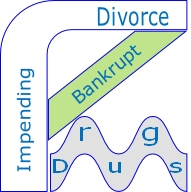
Call: Stoke (01782) 639716 ... for a fast, professional, friendly service.



- The beneficiary is taking recreational drugs -
and if they receive your gift it could be used to feed their habit; - a beneficiary’s marriage is failing and you don’t want the in-
law to potentially benefit from the divorce; - a beneficiary is about to be declared bankrupt, or has been made bankrupt, and you don’t want their inheritance to be used to clear their debts;
- The beneficiary is presently financially naïve -
and if they received their inheritance at this stage in their lives that they would fritter away the money; or - lack of employment -
you don’t want the beneficiary to inherit absolutely until they are holding down a full time job.
The Solution
The solution is relatively simple. By inserting a discretionary trust to your Will the trustees control when the inheritance will be paid out to your beneficiary.
In the case of your child taking recreational drugs this could be when the child is ‘clean’. In the case of your child’s marriage failing this could be when the marriage has either settled down, or after the child has divorced. Either way you can see how the parents (through their trustees) can control when the beneficiary receives their inheritance.
The Next Step
If you were to use our Home-Visit Will-Writing Service we will discuss with you the benefits and drawbacks of including any trust in your Will.
Please contact us to discuss your concerns.
How To Control Your Assets from the Grave

A Will trust enables a testator to exert some control over their assets after their death.
Control is exercised through the trust’s trustees - who will be given instructions prior to the testator is death as to how the trust fund is to be operated.
This feature can be used when you have concerns about the impact of your beneficiary receiving their gift, and therefore wish to defer your beneficiary receiving their inheritance.
This could be for a number of reasons e.g.


Uses of Trusts
Discretionary Trust
A ‘discretionary’ trust is a trust in which the trustees decide who is to benefit from the trust’s assets and when. This flexibility allows testators to hand over responsibility of distributing the trust fund after their death to their trustees.
Case study (bankruptcy)
A parent P advised that his son S was going to be made bankrupt by his bank. P’s Will was rewritten so that in the event of P’s death his son’s inheritance would not go to the Official Receiver (to clear the son’s debts) but be retained in the trust fund until the son S was discharged. At that time the trustees would then release S’s inheritance to him so that he could rebuild his life.
After two years son S was discharged of his bankruptcy and P rewrote his will removing the trust clause as it was no longer necessary.
